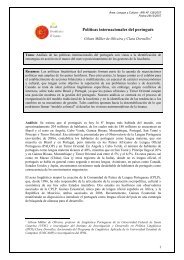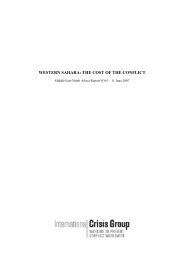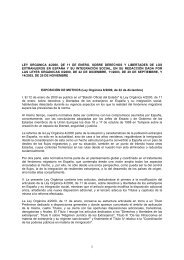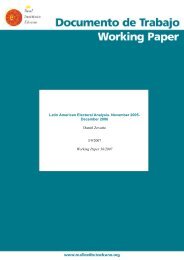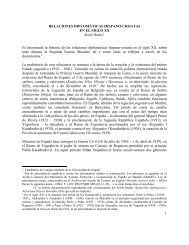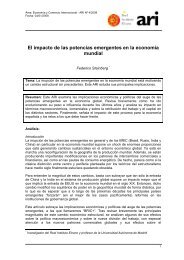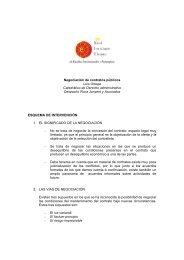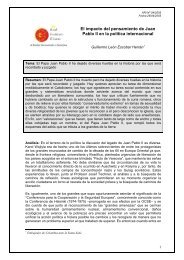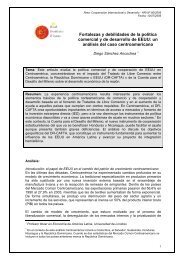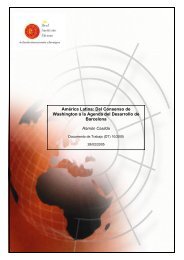Spain and the United States - Real Instituto Elcano
Spain and the United States - Real Instituto Elcano
Spain and the United States - Real Instituto Elcano
Create successful ePaper yourself
Turn your PDF publications into a flip-book with our unique Google optimized e-Paper software.
LOOKING AHEAD 125<br />
lifting of <strong>the</strong> EU sanctions against Cuba, but only 37% viewed <strong>the</strong> support for<br />
Chávez as positive.<br />
In o<strong>the</strong>r Latin American <strong>and</strong> Caribbean countries – Bolivia, Ecuador <strong>and</strong><br />
Haiti – <strong>Spain</strong> has been helpful in crisis situations. <strong>Spain</strong>’s Foreign Ministry<br />
coordinated with <strong>the</strong> US State Department on ways to resolve <strong>the</strong> political<br />
crises in Bolivia <strong>and</strong> Ecuador, which saw <strong>the</strong> departure of both countries’<br />
presidents in 2005. In Haiti, <strong>Spain</strong> is part of <strong>the</strong> Brazilian-led UN peacekeeping<br />
force. <strong>Spain</strong> also has a capacity to act as a kind of broker in crisis situations in<br />
<strong>the</strong> Middle East, as its image is generally good in Arab countries <strong>and</strong> also in<br />
some quarters of Israel.<br />
<strong>Spain</strong>’s two main political parties are now widely in disagreement over<br />
foreign policy, particularly that towards <strong>the</strong> <strong>United</strong> <strong>States</strong>. According to<br />
<strong>Elcano</strong>’s June 2005 barometer, 86% of respondents believe <strong>the</strong> Socialists <strong>and</strong><br />
<strong>the</strong> PP are in disagreement over <strong>the</strong> <strong>United</strong> <strong>States</strong>. Foreign policy has become<br />
much more of a domestic political issue. FAES, <strong>the</strong> PP’s think tank, is very<br />
active in aggressively denouncing <strong>the</strong> Socialists’ foreign policy.<br />
A victory by <strong>the</strong> PP in <strong>the</strong> next general election, to be held by 2008, could<br />
well see a swing back towards a more pro-Atlanticist foreign policy; however,<br />
given <strong>the</strong> profound opposition to <strong>the</strong> war in Iraq <strong>and</strong> <strong>the</strong> electoral setback for<br />
<strong>the</strong> PP in 2004 (largely because of its support for <strong>the</strong> war), a future PP<br />
government would probably not go as far as <strong>the</strong> last one did in <strong>the</strong> event of<br />
fur<strong>the</strong>r military incursions. By moving closer to <strong>the</strong> <strong>United</strong> <strong>States</strong>, <strong>the</strong> PP was<br />
striving for “major player” status for <strong>Spain</strong>, but opinion polls suggest that most<br />
Spaniards do not want to move in this direction. This means that however good<br />
an underst<strong>and</strong>ing <strong>the</strong>re is between <strong>the</strong> Spanish <strong>and</strong> US governments, as long as<br />
it is rejected by <strong>the</strong> majority of Spaniards, Madrid will always be in a position<br />
of weakness in <strong>the</strong> face of Washington <strong>and</strong> will not be fully trusted.<br />
On <strong>the</strong> economic front, <strong>the</strong> future of US direct investment in <strong>Spain</strong>, indeed<br />
of all foreign investment, is closely linked to <strong>the</strong> long-term direction of <strong>the</strong><br />
Spanish economy <strong>and</strong> to demographics, a factor that tends to be overlooked but<br />
which is very important because of its implications for <strong>the</strong> supply of labour,<br />
dem<strong>and</strong> <strong>and</strong> consumption in <strong>the</strong> domestic market. Foreign direct investment in<br />
<strong>Spain</strong> as a whole is on a downward trend. Inflows amounted to $35.9 billion in<br />
2002, $25.6 billion in 2003 <strong>and</strong> $9.9 billion in 2004, according to <strong>the</strong> OECD.<br />
Excluding <strong>the</strong> investment in special-purpose entities (SPEs, financial<br />
companies set up to act as a conduit for investment), Spanish inward<br />
investment in 2004 was less than $1 billion, compared with inflows in <strong>the</strong><br />
range of $7-9 billion in <strong>the</strong> years immediately before.<br />
<strong>Spain</strong> is one of <strong>the</strong> EU economies that has grown <strong>the</strong> fastest over <strong>the</strong> past<br />
decade, in stark contrast to <strong>the</strong> relative slackness of <strong>the</strong> area as a whole. <strong>Real</strong>



